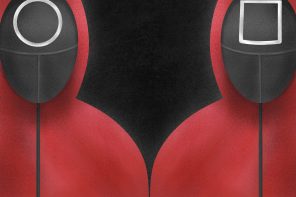You is a psychological thriller that revolves around the lives of Joe Goldberg, an obsessive stalker, and Love Quinn, a chef and bakery owner with more secrets than she can count on two hands. On the surface, You may appear as a show about murder, obsession, and intrigue. When you truly delve deep into the contents of the series, however, You is much more than a show about a stalker turned serial killer, as it presents the complexity of Joe Goldberg and Love Quinn as antiheroes. With the recent release of Season 3, You tests the bounds of psychological thrillers by presenting the antihero model in a different light than stories of the past.
When we think of the word “protagonist,” we tend to envision a hero fighting against evil. Neither Joe Goldberg nor Love Quinn fit the stereotypical “good guy” archetype, which is what makes each of their individual characters so complex. Many antiheroes, protagonists that don’t fit the stereotype of a conventional “good guy,” are presented as individuals who switch from the bad side to the good side in order to save the day, such as the way J.K. Rowling represents Severus Snape in Harry Potter. Snape’s loyalty to Lord Voldemort initially makes him a villain, but after he betrays Voldemort to protect Harry, he is seen in a more positive light. Though Snape switches to the side of justice for selfish reasons — spoiler alert for the classic series. He does so because he loved Harry’s mom — he is an essential component in Voldemort’s defeat, which makes him a stereotypical example of an antihero. You, on the other hand, is not your typical fight between a protagonist and an antagonist, as there is no moral good or bad side to begin with. The uniqueness of the antihero archetype in the show is largely due to the fact that the line between good and evil is blurred, and that Joe and Love don’t conform to the template that typically makes up an antihero’s journey.
You is a series that questions society’s typical understanding of morality.
Although Joe and Love do horrible things, such as killing people, we so badly want to root for them, even if they may appear to be stereotypical villains. Why is that? Something that differentiates Joe and Love from other TV villains is the way in which they justify their actions to the audience by claiming that their bad actions are done out of good intentions. Whether they are trying to save their marriage or create a good life for their son, Joe and Love rarely ever do bad things without cause, even if they may act a little impulsively. In this sense, You is a series that questions society’s typical understanding of morality.
Society treats the idea of good versus evil as black and white. Throughout the series, it becomes evident that Joe and Love cannot be placed into categories of either hero or villain, as they don’t fit society’s definitions of what it means to be a morally righteous individual. Joe and Love do bad things to help their family and friends, which makes them not only likeable, but also relatable. As humans, we often tend to look for the good in others. We relate to antiheroes because we are able to acknowledge their humanity, as well as their attempts to do the right thing, even if these motivations may be questionable.
Throughout the course of the series, Joe often narrates his inner thoughts and feelings relating to events occurring in his life. In hearing these narrations, the audience learns about his inner struggle of wanting to live as a good person, but being unable to watch the people he love suffer. This inner dialogue gives Joe’s character an added layer that allows the audience to understand the inner workings of his mind, and to feel the humanity that lives within his conscience. Joe often claims that he only does bad things to people that deserve them, and that getting rid of bad people benefits the greater good of society. In understanding this viewpoint, we, as the audience, tend to feel more sympathetic towards Joe. No matter how evil his actions, we understand that Joe is performing them because he believes he is doing something good.
Joe and Love are antiheroes in a different sense, as they have flawed versions of what it means to do good, and they express “acts of kindness” through the forms of murder and violence.
Antiheroes have been present in TV, film, and literature for years, but it is often difficult to craft these characters in a way that accentuates the flawed, yet caring aspects of their personalities. While many characters of this nature have existed before You, it’s undeniable that the show presents a new interpretation of the antihero. Two examples of well-known antiheroes are Klaus Mikaelson from The Originals and Harley Quinn from Suicide Squad. Something that both of these characters have in common is that they begin as full-fledged villains, but over time, they acknowledge the need to do good for the benefit of humanity. Joe and Love are antiheroes in a different sense, as they have flawed versions of what it means to do good, and they express “acts of kindness” through the forms of murder and violence.
You tests the limits of our knowledge on the binary between good and bad, and it questions the notion of a society-constructed morality as a whole. The way in which the show presents good and evil will likely pave the way for future shows by providing directors with more creative leeway to explore characters that push society’s typical understandings of good and bad.








